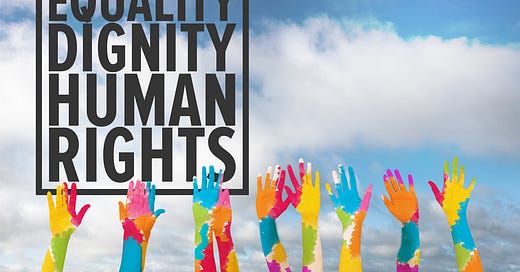The World Health Organization & United Nations Unite Against Biomedical Model of Mental Health
A joint report calls for an end to coercive & harmful treatment
The biomedical model has dominated clinical practice for the past 40 years, shaping our understanding of mental health. It is grounded in the notion that neurobiological factors are the primary causes of mental health conditions. Consequently, clinical care frequently centers on diagnosing, prescribing medication, and alleviating symptoms, often overlooking the broader spectrum of social and environmental influences that can affect mental health. This narrow approach to care fails to address the underlying sources of distress and trauma. Even more significantly, it has compelled millions to turn to harmful psychiatric drugs and led others into perilous medical experiments such as Electroconvulsive Therapy (ECT).
This approach, fully backed by the pharmaceutical industry and endorsed by the majority of medical professionals, as well as some psychologists and social workers, has been the prevailing paradigm for four decades.
The World Health Organization and the United Nations (acting on behalf of the Office of the United Nations High Commissioner for Human Rights) co-published "Mental Health, Human Rights, and Legislation: Guidance and Practice" on October 9. This publication places a primary emphasis on the human rights of individuals accessing mental health services, marking a significant departure from the prevailing focus of most existing mental health laws, which primarily revolve around coercion and confinement.
In 2017, United Nations Special Rapporteur on the right to health, Dainius Pūras, has called for a sea change in mental health care around the world, urging countries and psychiatrists to act with courage to reform a crisis-hit system built on outdated attitudes.
“There is now unequivocal evidence of the failures of a system that relies too heavily on the biomedical model of mental health services, including the front-line and excessive use of psychotropic medicines, and yet these models persist,”
Dainius Pūras,The United Nations Special Rapporteur on the right to health
The international reforms proposed are based on a clear understanding of what is wrong with our current, medicalized, approach to human distress:
Mental health and well-being are strongly associated with social, economic, and physical environments, as well as poverty, violence, and discrimination. However, most mental health systems focus on diagnosis, medication, and symptom reduction, neglecting the social determinants that affect people’s mental health.
If you've tuned into the Radically Genuine Podcast, you are already well aware of the perils associated with psychiatric diagnosis and medications. Patients and their families have not been adequately apprised of the significant hazards and have mistakenly equated mental health diagnoses with conventional medical diagnoses. The majority remain oblivious to the fact that DSM diagnoses are unreliable constructs and were never intended to be presented as medical conditions.
As the world progressively acknowledges the harms, we may be emerging from the dark ages. Whether the United States can break free from the pharmaceutical influence remains uncertain.
Countries should adopt a higher standard for the free and informed consent to psychotropic drugs given their potential risks of harm in the short and long term. . . . Legislation can require medical staff to inform service users about their right to discontinue treatment and to receive support in this. Support should be provided to help people safely withdraw from treatment with drugs.
Significant controversy surrounds the use of ECT and its associated risks, and there have been calls for it to be banned altogether. Its use has dramatically declined in many countries, and in Luxembourg and Slovenia, for example, it is not made available. . . . International human rights standards clarify that ECT without consent violates the right to physical and mental integrity and may constitute torture and ill-treatment. People being offered ECT should also be made aware of all its risks and potential short- and long-term harmful effects, such as memory loss and brain damage. ECT is not recommended for children, and this should be prohibited through legislation.
Ethical professionals and patients who have suffered harm, and whose advocacy has played a pivotal role in drawing attention to the psychiatric industry's abuses, welcome this report as a breath of fresh air. It comes as no surprise that Psychiatrists who have reaped professional and financial benefits from the medical model have resorted to ad hominem attacks for decades. Accusations such as "Scientologist," "Pill Shamer," "Anti-Psychiatry," and "Spreading Misinformation" have been the response from those who cannot scientifically defend traditional treatments and the alarming statistics indicating deteriorating mental health among individuals receiving psychiatric care.
The tide is shifting. In a recent episode of the Radically Genuine Podcast Listen Here, we engaged in a conversation with Dr. Josef Witt-Doerring, a psychiatrist who specializes in the process of tapering patients off psychiatric medications. Over the past four years, he has successfully assisted hundreds of patients in discontinuing their psychiatric medications. Dr. Witt-Doerring, an accomplished expert in psychiatric medicine and the recognition and management of adverse drug reactions, has also had the privilege of aiding numerous patients in litigation concerning psychiatric drug-related injuries. His previous roles included positions with the FDA and within the pharmaceutical industry. When individuals like Dr. Witt-Doerring, who have insider knowledge, begin to voice their perspectives, the arguments in favor of the status quo lose their resonance.
Unfortunately, most practicing medical professionals still adhere to outdated ideas, promote harmful guidelines, and misrepresent the scientific literature. Our sick care system perpetuates pharmaceutical marketing, with pills remaining a primary frontline treatment, leading to a deterioration in patients' conditions. Change will only take place when harmed patients and ethical mental health professionals actively advocate for it.
BE LOUD!






Television commercials promote adding more prescriptions to your regimen to help with side effects from the medications you're already on. Where does it stop? One medication leads to another and another. Thank you for bringing this dilemma to the public.